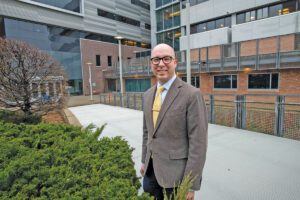In December, assistant city administrator John Fournier presented city council with the staff’s 2023 Economic Development Report. A key recommendation is a new site plan approval process that will save developers time and money by requiring fewer reviews.
Fournier, who wrote the plan, says the goal is “to stimulate a level of housing development that, over the long term, can help stabilize housing prices and get a handle on our housing affordability issue”—both for market-rate housing and subsidized affordable units.

City council “has made it clear that affordable housing is a priority,” says assistant city administrator John Fournier, who wrote the economic development report. “The council sets the agenda and sets the direction.” | Photo: Mark Bialek
Mayor Christopher Taylor and his change-positive allies who won full control of city council in 2022 have already taken major steps toward making it easier to redevelop large areas of the city. In 2022, councilmembers voted to remove themselves from the approval process for by-right projects that comply with existing zoning, and in December 2023 they rezoned large areas along Eisenhower, West Stadium, and Plymouth Rd. to permit downtown-scale buildings in what are now low-rise commercial strips. It’s already resulted in a massive apartment and retail proposal called Arbor South that would add more than 1,000 units around the 777 Building.
“We have an interest in seeing those parts of the city developed in a way that they get more dense and walkable,” says Fournier. “Because of the zoning, there will be developer interest, and there will be more opportunities for the city to step in and be a partner with developers and get projects up and off the ground.”
Partnerships come into the picture because the report envisions the city playing an active role in redevelopment by buying, rezoning, and selling property. That’s not easily done now, because the city charter requires a supermajority of eight votes to approve land purchases and development agreements.
The report recommends dropping the supermajority requirement and shifting development agreements to the staff-led site plan approval process. Fournier says this will speed the redevelopment process, particularly for affordable subsidized housing.
According to ArcGIS, an online mapping program, since 2015 Ann Arbor has developed 211 affordable housing units with 380 more planned over the next three years. City council “has made it clear that affordable housing is a priority,” Fournier says. “The council sets the agenda and sets the direction.”
The city could acquire a purchase option or buy a property outright, he says. But “the city wouldn’t be building the housing or building the office space. We will move the property through the development process and devolve it to a private partner.
“A best-case scenario is that we get feedback rooted in [council’s] vision for the city, based on the community’s vision of the community’s priorities, and that we have a path forward that we can work on. Our direction needs to be clear and sustainable.”
Once the process is complete, the property would go through a direct sale or request for proposal (RFP) process with a development partner. This will “get the property back into private ownership and developed,” says Fournier.
Fournier believes the preapproved projects will appeal to developers because the city would take care of the majority of regulations and fees that it typically imposes when approving site plans. He says the report has received a favorable reaction from city council, but even assuming that members adopt all the recommendations, it could take as much as a year to enact them.
Fournier says no area is off-limits, but the first priority will be looking at options for new affordable housing in TC1. He compares the potential opportunities to the Catherine St. project downtown, where Avalon Housing is moving forward on developing a six-story affordable housing complex on a parking lot.
Whether owned by a nonprofit like Avalon or the city’s housing authority, the subsidized projects will be tax exempt. But Fournier expects that overall, redevelopment will also help with “budget issues in the city.” He continues, “We need to make sure that our properties are developed and add taxable value. Those are the North Stars as to why people should care about this.”
The city’s affordability crisis, he says, is “fundamentally a supply problem. More people want to be here than there are units available. It is difficult to secure housing in Ann Arbor, and it is very expensive.
“It takes time to get housing development up and running, and it takes time to build enough to impact the housing cost curve. Our goal is to lower that slowly over time.
“If we can make an impact on supply, we hope that we can solve this problem for future councils and future iterations of this community.”
I love the idea that the city is finding someone to help design good use of public and private mix living! The high rises have gone crazy and AA no longer looks or feels like the quaint college town we moved to 40 years ago!! I’m all about change, it’s fun to see things change. But when SO many high rises have changed the landscape of our town… and UoM taking over every space possible! Taxes have to be collected, I understand and they aren’t making more land. Anyway, thanks for trying to make it all work hiring a city planner!!